The ways of the great General Motors are often mysterious and hard to understand. For example, why did GM decide to sell their European built Opel division products in America before there was even a gas crunch? Then, after making this decision, why did they decide to sell them through Buick dealerships, right next to the huge land barges that docked in their showrooms? Strangest of all, why did GM decide to produce what was, for all intents and purposes, a mini Corvette in an already crowded imported sports car market? There are many mysteries to ponder here, but the biggest one facing us is how did this 1973 Opel GT, found on Craigslist in Douglasville, Georgia, end up being in such good condition when so many of its brethren have returned to the Earth through oxidation? Being sold for a cash only price of $4500, this little GT may be a diamond in the rough just waiting for a saucer eyed Opel enthusiast to gobble it up.
To understand Opels, you have to understand Europe. Cars in Europe have, for the most part, less stringent demands placed upon them. Distances driven between cities is usually shorter than similar scenarios in the United States. Many inner city roads are smaller, as most were built in an age where a horse was the fastest vehicle of the time. The other big difference is that fuel is taxed at a much higher rate over there than in America. Therefore, cars have to be a bit smaller, more economical, and they don’t usually end up with the mileage that American cars rack up. General Motors, in its quest to be a global company, acquired Opel in 1931. They held the company until earlier this year, when it was sold to a conglomerate called Groupe PSA. During its history as a General Motors subsidiary, it bounced around from being a drag on company finances to being a cash cow for GM during the lean years before the government engineered bankruptcy.
As for the decision to sell the Opel GT and Kadett in America, my guess is that GM either used the whole thing as a tax write off, or as a hedge against the rising sales of similar sized Japanese cars. The Opels would at least give GM something to sell in that size and general price range. Yet, they didn’t meet the sales goals needed to really establish the brand in America. Part of the reason that they were sold in Buick dealerships is that Buick didn’t really offer any competing lower priced models that were made in America. That was likely a double edged sword, as I imagine Buick dealerships weren’t exactly hangouts for import buyers or people looking for a cheap ride. The Kadett was just what nobody was looking for, at least but the GT had some style. Looking inside and outside like a little 1968 Corvette, the GT competed against cars like the MGBGT, Triumph GT-6, and the Datsun 240Z, at least under the classification of hard top sports cars. More than likely, it was fighting for the customers that were looking at Triumph Spitfires and MG Midgets. While the styling was fantastic, the weak engine was no match for the 240Z, or the MGB and Triumph GT-6 offerings. The other problem was build quality.
Buyers ended up with a car that was kind of a misfit. The engines were too small to make them fast enough to attract hard core enthusiasts. The styling made you think of a Corvette, but the acceleration was pure Kadett. Parts were never as common as those of other makes, and GM dealers were lukewarm at best in regards to repairing and servicing these little cars when there was cash to be made on the American side of the dealership. These problems were minor in comparison to the number one issue: rust. Rust simply eats these cars alive. From the battery tray, to the pivot points for the headlights, and, of course, to the floors, these things returned to the Earth with a vengeance. In doing research, I came across a great thread in the Opel GT Forum concerning buying an Opel GT. One of the opening comments basically tells you should approach a purchase as if you are buying a body shell, and you want the best (read: rust and crash damage free) one you can find for a restoration. It further warns you that 95% of the parts you need are out there, but key sheet metal parts are not being reproduced.
The parts that can be found are not that out of line, and there seem to be a few vendors to choose from. That’s a lucky thing, because it seems hard to find one that needs nothing at all. The car we are looking at in this report is advertised as being in good condition. Claiming that the car is rust free (the only one on the planet), he further states that it has great paint and a good interior. The paint part I believe, as the car looks stunning in this pastel shade of yellow. As for the interior, it would be nice to see under the cheap, ill fitting seat covers. Even if the seats are in poor condition, proper replacement upholstery can be found.
As for the rest of the interior, it looks like the new owner can plan on spending some time making the kick panels fit a little better. The dash appears to be re-skinned with a thin vinyl overlay, but you’d probably be better off peeling it like a banana and replacing it with a hard plastic overlay. Another troubling area is under the dash, where a dangling wire awaits your upside down visit. The trip under there might not be too bad, as many claim these little Opels are surprisingly roomy for people who are over six feet tall. I don’t see how, but that’s what they say.
Under the hood, we see what I believe to be the later 1.9 liter inline four, which was supposedly the only engine available with the three speed automatic transmission. Believe it or not, the owner claims that this car is equipped with air conditioning. Unfortunately, the “pump” is out of the car. I guess the owner means the compressor, but if anyone can tell me where it would fit I would be appreciative. The engine bay is pretty crowded, but not Sunbeam Tiger crowded. Everything appears to be there, and the owner states that it cranks, runs, and drives! While I always assumed the three kinda go together, it is reassuring that they can be looked at as separate achievements.
So, what we have here is an Opel GT that, if you can believe the ad, is one of the better examples of the breed. The owner is looking for $4500 cash, and could probably get it from someone who just has to have one of these. The rust free claim is the biggest draw here, but I would plan on renting some lift time from a nearby shop and giving the car a deep, deep exam before ponying up some cash. I look at this car and, although I like the color and general look, I just can’t justify having one at this price. You can get a pretty nice MGB for the same money, or even a mid seventies Corvette in average condition if you throw in a thousand dollars or so. Both have an extensive network of parts providers, support clubs, and fellow owners to get you through the rough patches of ownership. The Corvette offers the tantalizing shape and adds to that the wonderfully reliable and powerful Chevrolet drivetrain. In my eyes, and I am biased as a Corvette owner, this is half the Corvette for nearly all of the costs of a Corvette.
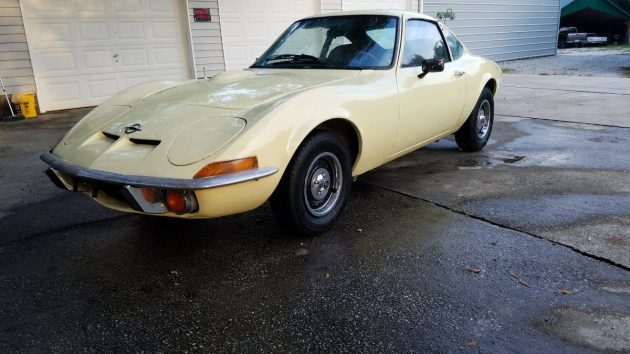
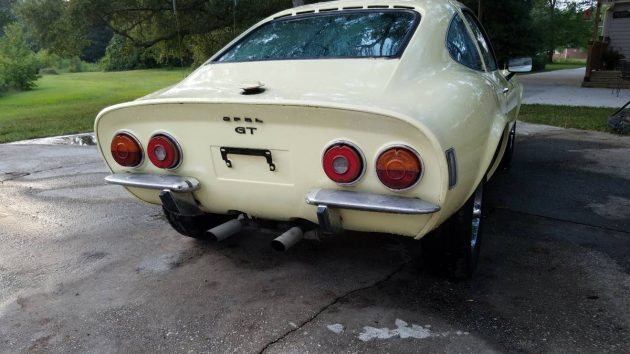
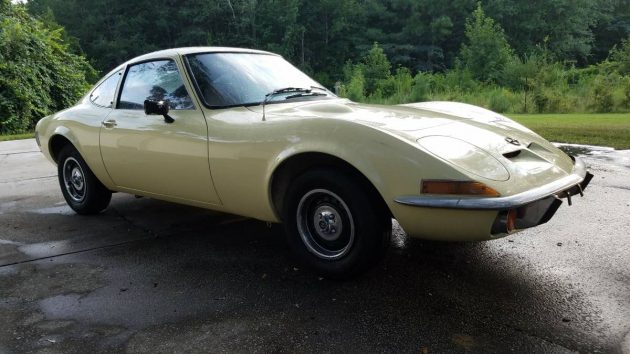
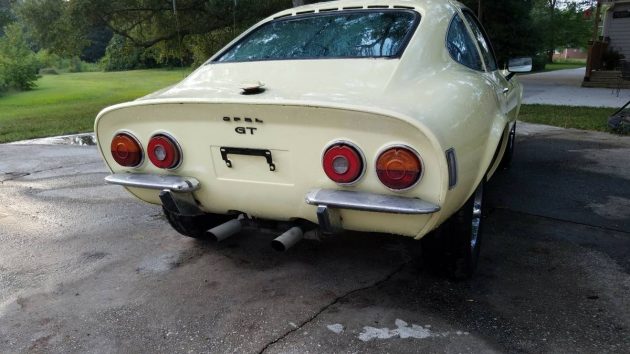
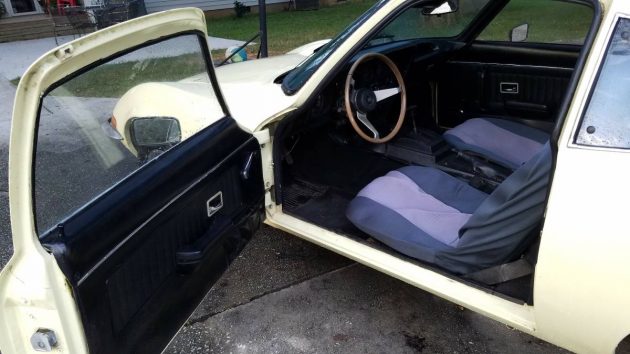
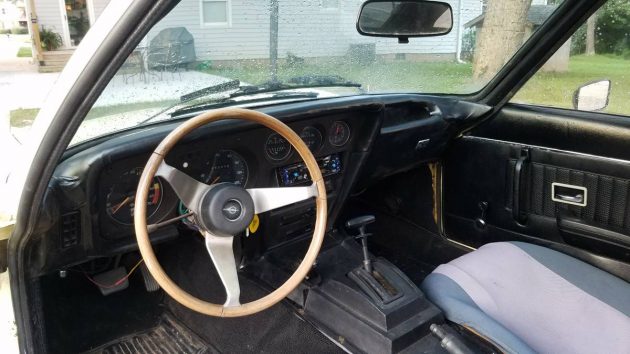
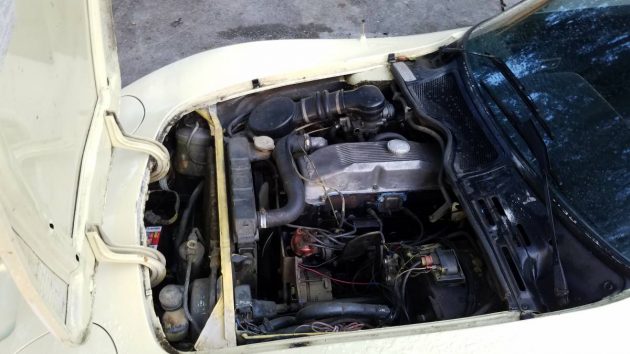




The ad clearly contains a typo , ” rust free ” ought to read ” free rust ” .
Or “rust, free.”
Can someone enlighten me how are mgb engines so much better than this? Didnt the US versions use a combination exhaust-intake manifold with a single stromberg with something like 70hp?
I also disagree that you can get a nice 70ties c3 with a “wonderfully reliable and powerful drivetrain”. A 5 thousand dollar corvette will be neither powerful no reliable. And i am biased as well, being a c3 owner.
I’m with you… Poppapork The MGB has the same HP and Torque and is slower to 60..and in the 1/4…….., and is ancient in design.
but the MG Dealers respected their cars…and the GM Dealers did not.. ..and customers knew it..
I’ll echo a Facebook comment and say that perhaps the Corvette resemblance does the Opel a disservice. There were a series of GT-type design exercises along very similar lines from various GM divisions in the early and mid ’60s (1962 Corvair Monza GT, 1964 Pontiac Banshee I, 1965 Corvette Mako Shark I, 1965 Opel Experimental GT), and it just happened that the Opel and the Corvette were the two that went into production.
The Opel was a good handler with a very useable torque curve (at least with a manual, and with the 1.9, which was the only option in the U.S. after 1970 anyway), and I can confirm that the interior is surprisingly roomy, especially for long legs. Rust is the common enemy of any old European (or American, or Japanese…) car, but the body construction and finish of the GT was very, very good for the time and price (~$3,500). This was handled in France by Brissoneau & Lotz.
The July, 1971 Road & Track cover story is a comparison between the Datsun 240Z, MGB GT, Triumph GT6, Fiat 124 Sport Coupe, and Opel GT; R&T rated the Opel third, ahead of the MG and Triumph—which were rated significantly worse than the top three.
Google Matra Bonnet Djet images and you’ll see that Opel stole their styling from the Djet, a much faster and more interesting car. My ’66 Djet was raced at Watkins Glen, has 4 wheel disc brakes, full IRS with dual shocks & springs, and was the very first mid-engined sports car. Tube chassis, all fiberglass body built by Matra, France’s aerospace co. My car also has the Gordini racing engine: Gordini custom hemi alum head, two side-draft dual Weber carbs, tubular header & oversized cast alum. racing sump. Compression with the Gordini head was 10.4:1, giving the 1100 cc Renault engine 94 hp.
Before I bought mine I talked with a W. coast owner who’d raced his at Laguna Seca. Said he was on a slight downgrade doing 132 mph when the engine blew – not too shabby! Shame on GM for copying a gorgeous design and saddling it with Kadett performance.
I would have to agree, I think Opel copied the Djet. If I had seen a Djet without knowing what I was looking at, I would have thought it was a customized Opel GT.
Wow! 94 hp! As opposed to an old C4 Corvette L98 with 250 hp & 330 ft lbs of honest-to-goodness American torque.
Never any rust in the lower quarters, either.
Personally, I’m also a Corvette owner (91 C4). I do like the OPEL GTs styling and if I also didn’t have 2 other cars to work on, I’d get this, stuff in an LS/Auto w/a 9″Ford and go have some fun!
No link to the ad? There is a 1970 Opel listing in Dalton, Ga, in HORRIBLE condition for 4K!!
A friend of mine, back in the 70’s, had one of these. It was the epitome of the old saying it’s more fun to drive a slow car fast than it is to drive a fast car slow. Always had his foot buried into the floor board and this little Opel took it all and gave it back with surprisingly fun performance and great handling. It’s what we drove around in when he wasn’t on his Laverda and I wasn’t on my Ducati SS
That this advertised one is an auto is…disappointing.
GM and the UAW are co-managed by the Magic 8 Ball and Ouiji board.
As an owner of several GT’s I can attest that the car is comfortable for people over 6ft. I can put the seat back all the way and wouldn’t be able to push in the clutch fully. If you look closely at the engine compartment picture you will see the A/C lines just in front of the coil. The compressor mounts right above the Alternator and the coil and voltage regulator are moved to different locations for fitting of the compressor. Looking at the pictures I see the main duct panel which fits over the center console is missing. Not sure if he has it or not but that is where the vents are and the temp/fan controls reside. All of the other components (fan and evaporator) are located under the rear deck behind the seats. There is big following for this car and several shops which specialize in restorations. Like any other car, knowing what you are getting into before hand is always a necessity. But at least Opel owners have a lot of resources and people to help out when needed.
The GT made 102 gross horsepower and weighed somewhere around 1800 pounds. 0-60 times were in the 10 second range, and top speed was over 100. This sounds poky today, but by 1970 standards, this was a world-class compact sports car. The 240Z wasn’t more than a second faster to 60, didn’t have the Opel’s roadholding and rusted WORSE.
Opels are fussy if not cared for, but are hugely competent and reliable when maintained. It’s a shame they have been forgotten.
If I have to hear about this dead guy’s BBQ sauce one more time I am going to rip my own ears off. I don’t normally mind the adds, and understand the need for them to generate revenue. However having them playing in a never ending loop and taking me back to the middle of the article every 20 seconds is ridiculous.
Just become a “Member” no ads!!! Much better!!! Small price to pay if your “addicted” as I am!
Found it!
https://macon.craigslist.org/cto/6281655029.html
After spending 3 years restoring a 69 gt, I can attest to how great of shape this car is. Minute was terrible as it sat in a driveway for 11 years before I found it. This car is sexy as hell with all the right curves and is a pleasure to drive, it handles like a go cart! Worth every penny of the 4500, IF it was a manual transmission.
Don’t know why you’re being so hard on this car. I wouldn’t have it either, especially with the automatic, but in their day these were cute little sporty coupes with a touch of cool, and not demonstrably worse than other small cars. People liked them, and they got good reviews for handling. The power wasn’t bad for the time, and they were affordable and more refined than MGs and Triumphs, as the allusion to the comparison test above notes. Just part of the ’70s scene.
I liked these and always intended to get one someday,,, When growing up my dad had an Opel Rally for commuting. Was different than the GT nose but had some cool 70s euro rally styling on it. Was a decent car and decent power.
Better get one soon! These are big bucks in EU…
The big difference with a Corvette, VS an Opel GT…..
Corvettes are like belly buttons, EVERYONE has one,
Opel GT is rare and unique !
Nice car, wrong color (and trans)…
I bought a ’69 Opel GT with manual, red on Silver. Drove it for two years and 60K miles. Very fun car for the time although I still don’t know why I didn’t buy the Datsun 240Z which came out same time.
After about 20k miles I changed the intake manifold to accomodate twin side draft carborators, which changed the whole game. Living in Idaho at the time, driving was the major form of recreation. Put a lot of fun miles on that car cruising the western States.
Forget doing ANYTHING under the dash without a total disassembly of the interior, unless you are one of those British motorcycle engine builders with the 1/4 scale 3rd arm and hand coming out of the center of your chest – and then you’d still need to be double jointed…… A friend and I spent several hours one
Saturday attempting to remove the radio from his wife’s Opel GT – and he ended up replacing the car with a 240Z instead. The local auto stereo installer refused to even attempt doing the job……
Some say the Norton Commando was built around the Horn, Totally inaccessible mounting above the swing arm, many say the first item on the assy line was the Horn and the rest of the bike built around it.
We had an Opel rally, and did not have any such issues,, but that was many years ago and maybe I just blanked it out.
Nice, I just bought a 69 silver with red earlier this year. Love those cars, always had one off an on since the 80s…
Being an European, I’m very used to European cars. Often the problem With the US models are the auto boxes. The 3 speed boxes were ok on a strong v8 but hopeless on a 4 cylinder. The engine in Opel was rather good and for the time it had a good weight/performance ratio. But with a 3 speed auto it was sluggish. In Europe in the 60’s and 70’s very few cars with autoboxes were sold.
Cars like Opel GT, Volvo P-1800, Ford Capri and Saab Sonett were never meant to be very sporty but a stylish alternative to the middleclass.
Converting to a 4 speed is very easy on those. Just need the trans, front drive shaft, clutch and brake pedal and a clutch cable. Parts car is your best friend. I did a conversion in less than a day.
Jeff, I’m sure there has been more than one book written about why GM decided to sell Opels under the Buick marquee.
Nice looking car. I had a neighbour when I was a boy who had an Opel GT that looked just like this. His was a chocolate brown colour. I didn’t get to see the interior of the car, so I can’t remember if his had a manual gearbox, or if it had an automatic.
Greetings and I hope this email finds its way to you. I had a 1973 Opel GT exactly like this, (Back in 1975) exterior color was Chrome Yellow, black interior, AT AND it had air conditioning. The air conditioning compressor on the 1973 Opel GT I had was located/mounted on the passenger side where you see the air cleaner on this under hood picture. The installer/Dealer used a hammer to ding in the area above the shock tower. The air cleaner had a hose running to the front in front of the battery. The AC compressor I had was a York style but GM Dealers also installed the Frigidaire type compressor on the drivers side. The rims on this 1973 Opel GT are not the original 1973 rims. The console in this Opel doesn’t have the AC console built in with the shifter. I currently have parts on Craigslist left over from the ’73 Opel GT I restored-took 4 years to complete. I worked on many Opel’s way before today’s time. Take care and enjoy your Opel GT!! Looks GOOD!!!
have had my gt since september 1971 …….. it looks just as it did on day one and has been my good and reliable friend all along ………….. 1.9 four speed ………. burnt orange/black interior ………. very comfortable ………… high revving engine and good on twisty roads, competent cruising on boring roads….. a driving car, not a drag racer ……….. holds well on twisty roads and holds the road better the faster you move ……… like many things, if you treat it well, it will perform and survive well ………. i thought it to be superbly beautiful and think it severely under-rated …..
FWIW, there’s some interesting info on the development of the 1.9 by GM engineer Tom Goad who passed away recently. His son in fact raced those cars locally at Waterford Hill in MI.
http://www.pontiacsonline.com/TOM%20GOAD.htm